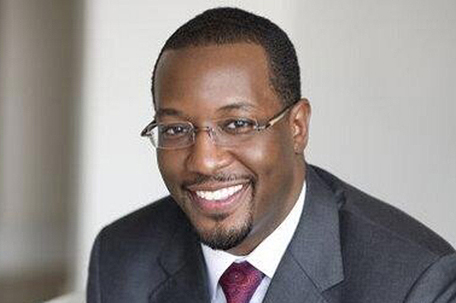
This week’s focus is on a local businessman who is changing the game for others who are underrepresented in the business world, Sulaiman Rahman.
As the founder and CEO of organizations DiverseForce, P4 Hub, and UPPN (BBEx Network), Rahman has been providing a service for men and women who wish to take their place in the boardrooms of the working world and lend their voices to the decision-making process.
Through his newest creation, P4 (Public, Private and Philanthropic Partnership) Hub in Germantown, Rahman hopes to advance racial excellence and equity. P4 celebrated its grand opening last Wednesday with over 600 people in attendance.
Some of you may also know Rahman as the founder of the Urban Philly Professional Network (UPPN) which hosts after-work events for professionals that allow them to network and socialize in welcoming and high profile environments in the city.
cj: How did you begin this empowering networking organization?
SR: UrbanPhilly.com was a platform where everyone would upload their events and we would basically have a platform to approve the events. Then people could able to find out [about] different events going on in the city. But as Facebook and other cultural media platforms emerged, it became more difficult to monetize. … so, we took control of the quality by having events that focused on after-work networking, bringing professionals together connecting, doing it once a month, and [that allowed them to] experience the city. The focus [is] on engaging and empowering, connecting that next generation of business and civic leaders by engaging them in community and civic involvement, empowering [them] to advance their careers and build up their businesses, and connecting [them] with others who share similar interests.
cj: How did you get involved in serving on boards?
SR: As a result of the connections [I made] with professionals and others who share similar interests. What happened from that was [that] having professionals meet with [other] professionals [made] it attractive to organizations and boards [who] were trying to connect with those audiences as well. Then I was asked to serve on boards — [it]was in my late 20s and early 30s when I started serving on non-profit boards. In 2010, I was the chair of the board at the African American Chamber of Commerce. Also, Mayor [Michael] Nutter appointed me to PDIC’s board. I was sitting on the board [of] the Philadelphia Film Society [as well] and really saw how non-profit boards were, like, [at] the epicenter of the cross-sector of collaboration [needed] to solve some of our city’s most pressing challenges.
cj: Why do you feel that it is important for individuals that are underrepresented to sit in the boards rooms of various entities?
SR: That experience of being green on the board and not really understanding what my role was — a kind of baptism by chairing the board — made me realize that there was a need [of training for] those who are just being exposed to this. You are sitting next to some of our city’s most powerful leaders, like executives at Comcast and others, and in the proximity of power where you can get things done. Because you are building these, like, social clubs and you are building these higher-level relationships, you can pick up the phone and get a lot of things done through the social capital that we kind of been boxed out of for a long time. So, over the years, [you recognize] the power of being on the boards, and the impact you can have in these large institutions. Most people don’t know that out of the top 10 employers, eight of them are non-profit organizations, hospitals and universities, [like] Penn and Jefferson, which means that these are not grassroots organizations. These are sometimes large institutions that affect every part of our life and many times, it’s not because of the blind spots on the board, [it’s that] there’s not accuracy in [current] solutions to make sure our city is inclusive to everyone.
cj: How was DiverseForce developed?
SR: We are being more intentional about how you build pipelines of talent. I am sitting on these boards and organizations that are saying that ‘we can’t find great Black talent.’ I am saying to them that I have thousands of them that I meet and see at our events and [that] we need to connect the dots. In 2017, DiverseForce’s opportunity for us to start with the boards which were connected to the work of UPPN to [this]kind of talent. We [also] partnered with the University of Pennsylvania to develop a 6-month curriculum to focus on leadership, board governance, and diversity equity and inclusion.
cj: Is the P4 Hub considered an incubator?
SR: It has incubation aspects to it, and [is] incubating talent and building pipelines of talent [by] giving them the tools and resources to grow.
cj: Is your organization a closed community or is it open to everyone?
SR: It is a closed community, membership model, [with] a different programming approach. We do want to have like-minded professionals who can come together and will share the values to be a part of our BBEx network. I am committed to lifting as I climb and giving my time, my talent, my treasure, and my tithes to give back, making sure that we are sticking to our commitments, building good relationships, being committed to excellence, if you will, and being that aspirational capital for our next generations as well in ways that we can move [them into] leadership to make sure that we democratize excellence.
If you have not yet visited the P4 Hub for one of their community events, it is highly recommended. You and your child or children can really benefit from the P4 Hub institution and our new leaders in the City of Philadelphia.
Here is the website to help you learn how to build up your own time, talents, treasure, and tithes: https://www.p4hub.com. Until next time….PEACE!
cj is a poet, educator, motivational speaker, and inspirational writer who resides in Philadelphia. If you were moved by this piece, shoot cj a “like” or comment at: [email protected].

















Leave a Comment